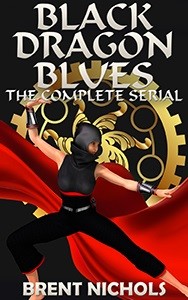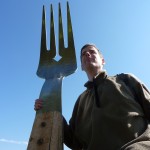Guest post by by Brent Nichols
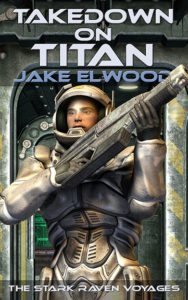 I’ve been writing for a long time, and I’ve got the knack of it now. I can get word onto the page, and they tend to be reasonably good words, too. Writing isn’t a problem for me these days.
I’ve been writing for a long time, and I’ve got the knack of it now. I can get word onto the page, and they tend to be reasonably good words, too. Writing isn’t a problem for me these days.
No, the problem isn’t the writing. It’s the NOT writing. The problem is all those zero-word days when all that lovely momentum I’ve built up just disappears, and the reproachful pale rectangle of a blank page stares at me from my computer screen until I can’t face it anymore and I go and do something else.
And when it happens, I never seem to know what to do about it. How to push through. How to reclaim my momentum.
Recently, though, I found some new insight, and it didn’t come to me through writing. I’ve been dabbling in art. I’ve been drawing and painting, and almost every sketch and doodle has me thinking, not about art, but about writing.
I’ve played around with art before, over the years. I’ve bought sketchbooks, made half-hearted attempts to draw, grown discouraged, and moved on. Then, last December, I decided to give art another shot. I promised myself I’d do a sketch a day through 2017. To my surprise I’ve actually made the promise stick. It’s well into July as I write this, and I’m going strong.
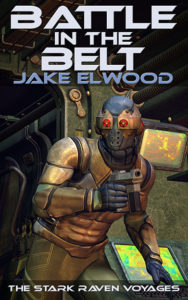 Some of my sketches make me cringe, but that’s okay. If there’s one thing writing has taught me it’s that the only way to make good art is to make bad art, over and over, as you learn.
Some of my sketches make me cringe, but that’s okay. If there’s one thing writing has taught me it’s that the only way to make good art is to make bad art, over and over, as you learn.
A couple of weeks ago I came across a couple of giant sketchbooks in my garage. They were nestled in the bottom of a box I hadn’t opened since I got married. I don’t know how long it’s been since I bought them, but it’s been more than ten years. And in all those years, I have not made a single mark in either sketchbook.
Not one line.
Today I decided to change that. There’s something intimidating about the sheer size of those enormous pages. It was a chance to make bad art on a dreadful scale. I know my skill as an artist, and while I’m a bit better than I was six months ago, I’m only too aware of my limitations. I knew how this picture would turn out.
But I kept thinking about the useless blankness of all those pages. The blankness had to go. I wouldn’t have a masterpiece when I was done. But it would be … not nothing.
I did a preliminary sketch, and then I set to work with ink and brush. And I made a mess. Parts of the picture worked, but overall it was blotchy and sloppy and deeply unimpressive.
No, I won’t be posting it here.
When it was done, I knew a bit more about how to use ink and brush. In fact, considering how little experience I have with the medium, I actually learned quite a lot. And my giant sketchbook, hoarded for so many years, finally contains a picture.
Not a great picture. Not even a good picture. But not nothing.
That’s how you write a brilliant story, one that will touch people, one they’ll talk about years after they read it. You write a page. If you can’t write a brilliant page, write a terrible one. And then another, and then another. Page after page, until one day you realize you’re writing something that’s actually pretty good. You face the blank page every day, and you refuse to settle for nothing.
And that’s how you get your momentum back. By refusing to settle for nothing.
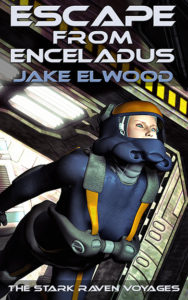 Your challenges will evolve, but they certainly won’t go away. Today, for instance, I’m avoiding the next scene in my novel. I don’t know how to get it right, so I’m painting pictures in old sketchbooks and writing blog posts for the Fictorians.
Your challenges will evolve, but they certainly won’t go away. Today, for instance, I’m avoiding the next scene in my novel. I don’t know how to get it right, so I’m painting pictures in old sketchbooks and writing blog posts for the Fictorians.
My writing, unlike my art, is deeply important to me. I can’t just shrug and tell myself that whatever I put on the page is fine because I’m learning. This is my profession now, and it’s the only thing I really care about. I really don’t want to screw up this next page. I don’t want to learn that I can’t get it right.
But right now that page is blank. It has no value, and it hasn’t taught me a thing.
It’s nothing. And I’m going to change that.
 Brent Nichols is the author of the Aurora-nominated novel STARS LIKE COLD FIRE and the sequel, LIGHT OF A DISTANT SUN. He self-publishes tales of science fiction adventure under the pen name Jake Elwood. He’s also a cover designer, making book covers from stock art. Eventually he’s going to do his own painted covers, but he’s not there yet. You can find his books on Amazon, and you can view his cover designs at CoolSeriesCovers.com.
Brent Nichols is the author of the Aurora-nominated novel STARS LIKE COLD FIRE and the sequel, LIGHT OF A DISTANT SUN. He self-publishes tales of science fiction adventure under the pen name Jake Elwood. He’s also a cover designer, making book covers from stock art. Eventually he’s going to do his own painted covers, but he’s not there yet. You can find his books on Amazon, and you can view his cover designs at CoolSeriesCovers.com.

